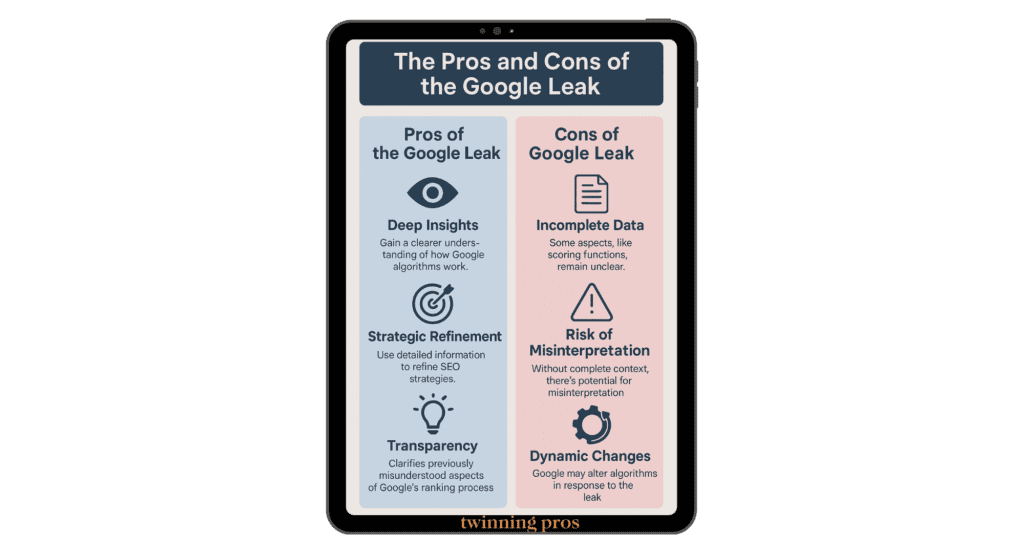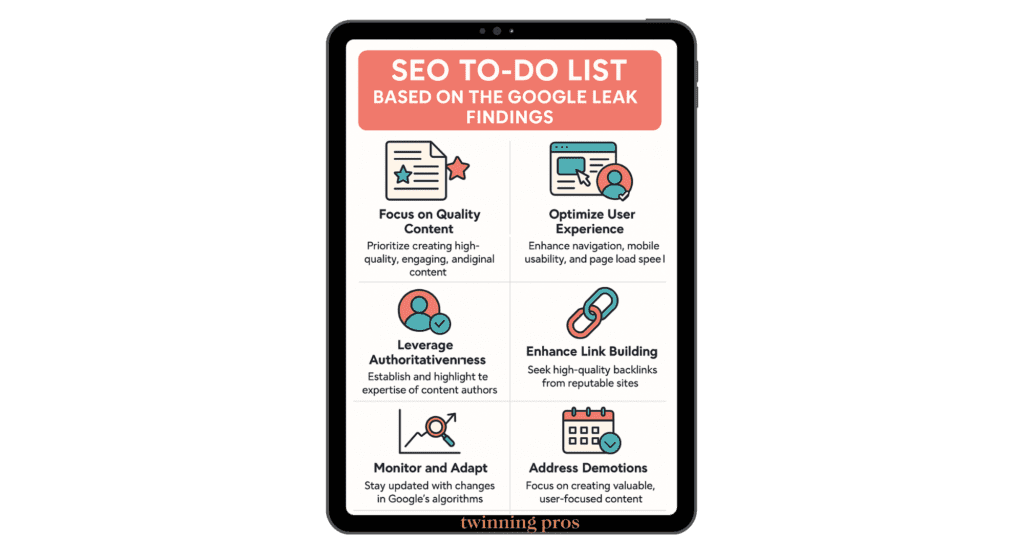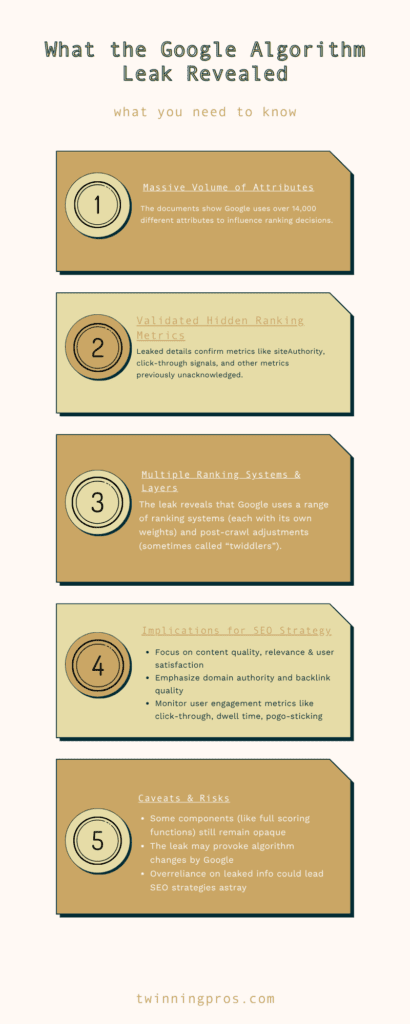In a significant revelation, internal documentation for Google’s Content Warehouse API has been leaked, providing a rare glimpse into the inner workings of the search giant’s ranking systems. At Twinning Pros, we’re committed to keeping you ahead of the curve. Let’s dive into what this Google leak means for your SEO strategy and how you can leverage this information.
Table of Contents
The Google Leak: An Overview
Google’s internal microservices, mirroring the Google Cloud Platform offerings, inadvertently made public the documentation for the deprecated Document AI Warehouse. Despite quick actions to rectify the mistake, the automated documentation is still accessible, granting us insights into Google’s data storage and ranking mechanisms.
Key Takeaways from the Google Leak
- Massive Data Repository: The leak has revealed that Google’s systems are far more intricate than many had assumed. The documentation details over 14,000 attributes influencing rankings and provides extensive data on content, links, and user interactions. This unprecedented level of detail gives SEO experts a clearer understanding of what elements are crucial for ranking.
- Over 14,000 attributes influencing rankings
- Detailed data on content, links, and user interactions
- Ranking Factors Unveiled: This leak exposes some misleading public statements made by Google. For instance, despite Google’s denial of using domain authority, the documentation confirms metrics like siteAuthority and click-driven ranking systems. This contradiction highlights the importance of relying on actual data rather than solely on public statements from Google representatives.
- Misleading public statements on domain authority, click usage, and sandboxing exposed
- Confirmation of metrics like site authority and click-driven ranking systems
- Complex Ranking Systems: The documentation outlines numerous ranking systems, each with unique attributes. It emphasizes the importance of quality signals and user interactions. Understanding these complex systems allows SEO experts to refine their strategies to better align with Google’s ranking criteria.
- Numerous ranking systems, each with unique attributes
- The importance of quality signals and user interactions highlighted

The Pros and Cons of the Google Leak
Pros of the Google Leak:
The leak offers deep insights into Google’s algorithms, providing a clearer understanding of their operations. This information allows for strategic refinement of SEO practices, making it possible to align more closely with Google’s actual ranking factors. Additionally, the transparency gained from this leak clarifies previously misunderstood aspects of Google’s ranking process.
- Deep Insights: Gain a clearer understanding of how Google’s algorithms work.
- Strategic Refinement: Use detailed information to refine SEO strategies.
- Transparency: Clarifies previously misunderstood aspects of Google’s ranking process.
Cons of the Google Leak:
While the documentation provides extensive details, some aspects, like scoring functions, remain unclear. This incomplete data could lead to potential misinterpretation. Moreover, Google may alter its algorithms in response to the leak, necessitating ongoing adaptation of SEO strategies.
- Incomplete Data: Some aspects, like scoring functions, remain unclear.
- Risk of Misinterpretation: Without complete context, there’s potential for misinterpretation.
- Dynamic Changes: Google may alter algorithms in response to the leak.

SEO To-Do List Based on the Google Leak Findings
Given the new insights, it’s crucial to adjust your SEO strategy to stay ahead. Here’s how you can leverage the leaked information:
Focus on Quality Content:
Prioritize creating high-quality, engaging, and original content that resonates with your target audience. Ensure that your content is relevant and informative to attract natural links and interactions. This approach not only improves rankings but also enhances user satisfaction.
Optimize User Experience:
Enhance your website’s navigation, mobile usability, and page load speed to provide a seamless user experience. Focus on metrics like dwell time and click-through rates to gauge user satisfaction and improve your site’s overall performance. A positive user experience encourages repeat visits and higher engagement.
Leverage Authoritativeness:
Establish and highlight the expertise and authority of your content authors. Use author markup and structured data to build credibility and trust with your audience. Demonstrating authority not only boosts rankings but also positions your brand as a reliable source of information.
Enhance Link Building:
Seek high-quality backlinks from reputable and relevant sites. Monitor your anchor text to ensure relevance and avoid potential demotions due to mismatches. Quality backlinks signal to Google that your site is trustworthy and authoritative, improving your ranking potential.
Monitor and Adapt:
Stay updated with the latest changes in Google’s algorithms. Continuously test and refine your SEO strategies based on performance data to ensure they remain effective. Adaptability is key to maintaining and improving your rankings in a constantly evolving digital landscape.
Utilize Fresh Content:
Regularly update your content to keep it fresh and relevant. Ensure consistency in dates across titles, URLs, and structured data to maintain credibility and trust with both users and search engines. Fresh content signals to Google that your site is active and up-to-date.
Address Demotions:
Be aware of potential algorithmic demotions and focus on creating valuable, user-focused content to mitigate these risks. Understanding the reasons behind demotions allows you to address and correct issues proactively, maintaining your site’s ranking stability.
Diversify Keywords:
Use a variety of related queries and keywords to drive broader traffic to your site. Ensure that your page titles match user queries to enhance relevancy and ranking potential. Having a diverse keyword strategy helps capture a wider audience and improves overall visibility.

What’s next?
To help you navigate these new insights, we’ve created a comprehensive Google Algorithm To-Do List. This resource is designed to help you optimize your site in line with the latest revelations.
Download it now and take your SEO strategy to the next level!
Snag Your Free Google Algorithm Guide
Stay ahead in the SEO game with Twinning Pros. Let’s turn these insights into action and watch your rankings soar! 🚀

SEO for Beginners
Learn from the SEO Strategist who has 75+ first page Google rankings under her belt.
We’re marketing nerds and business strategists that have generated millions of dollars in client revenue. We're sharing the systems and strategies to help your growing business with marketing that actually converts.
We're Tiffany + Tabatha

Comments